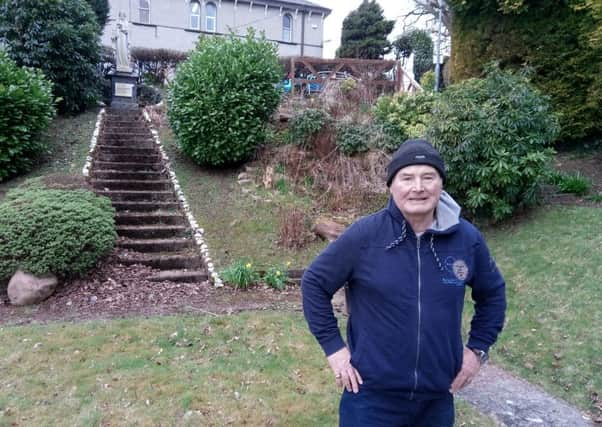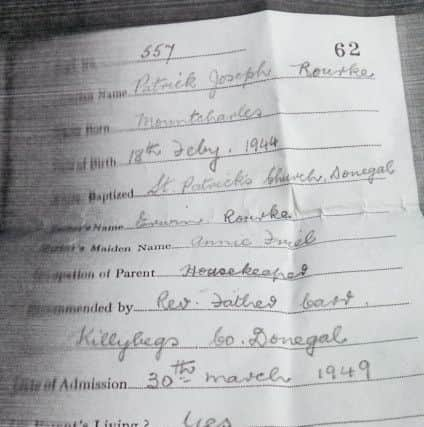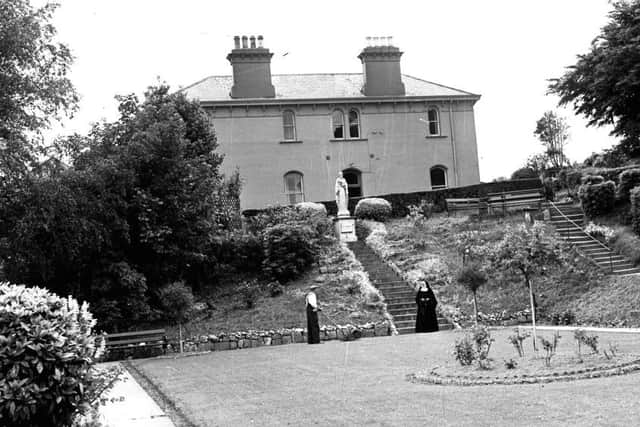Retracing family's '˜trail of tears' 69 years on


Patrick O’Rourke was just five years old and his sister, Eileen, only three years, when their parents Erwin and Annie O’Rourke, being in reduced circumstances, concluded they could no longer care for their children.
Patrick remembers his mother later in life recalling how she shed tears as she travelled from Killybegs and brought her daughter to the Nazareth House before walking with him to St. Joseph’s Boys’ Home in Termonbacca.
Advertisement
Hide AdAdvertisement
Hide AdMr. O’Rourke was among those who gave evidence to the Historical Institutional Abuse Inquiry about the mental, physical and sexual abuse he suffered during his time at Termonbacca.


Speaking after he made an emotional walk from Nazareth House to Termonbacca on Good Friday Patrick, now 74, said he had wanted to undertake a pilgrimage of sorts in solidarity with all those who were abused and who continue to suffer, as well as in memory of his parents and his sister Eileen, who passed away in April, 2011.
The break up of the family, on March 30, 1949, was to have a profound effect on the parents and children as they tried to come to terms with what happened over the years.
“It was 69 years ago today. All I know of that day was that my mother had to drag me over the steps coming up the Letterkenny Road. She toldAme years later: ‘You knew something was wrong because you were crying a lot and I was crying.’ My mother said I kept asking her on the way to Termonbacca, ‘Where’s Eileen?’ And, of course, I’d never travelled that far before.
Advertisement
Hide AdAdvertisement
Hide Ad“It was like a little trail of tears. That’s why today is a very emotional day for me. I’ve actually retraced the steps and I’m glad I did that. It’s in memory of them and it means I am not bitter or angry, nothing like that at all.


“I’d be thinking of Eileen today. She was very, very gifted and talented and beautiful. In later life she became a nurse. And like a lot of us, breakdown was a big thing. She suffered throughout all her life. It was a shame what happened there. She was 12 years in Bishop Street.”
Patrick said the family was informed that Eileen could get an opportunity to go to America ‘to bring her out of herself.’
“They said she was very talented and might join the ‘Little Gaelic Singers.’ That particular year, the Little Gaelic Singers ended up in New York on October 28, 1956 after doing a whirlwind tour of all the cities in America. They sang two songs on the Ed Sullivan Show and Elvis Presley was there. My sister would say she would go, but breakdown was an issue.”
Advertisement
Hide AdAdvertisement
Hide AdPatrick said some of the nuns had expressed concern about his family’s plight over the years. “When my parents would come in during the ’50s it was very difficult, it wasn’t so easy to travel and they’d have to go to two orphanages, one in Bishop Street and one in Termonbacca.


“When they’d come up they’d be upset. The Reverend Mother would bring them into a little parlour in Termonbacca and I’d be there and there’d be tea and she would say ‘What has gone wrong? Is there no-one to help you?’ She would say, ‘Your family is very talented, if they only got a chance.’ Some of the nuns were very aware too.
“My parents were a young couple, later on they had problems with authority; they felt they were at the mercy of everybody. They were very much loved, but some people in society could be cruel and there were people who were horrified. I’m mindful there were a lot of poor people, but in our case it got worse. Normally boats lift a little bit, but in our case it was the other way round. My mother went white in the hair when she was only a young woman with the whole worry and shock of losing her young family.”
Patrick said despite what happened to him in his youth, he retained a fondness for Derry. “The people of Derry have been through a lot themselves and I wouldn’t blame them for anything that happened. I loved being out among them as a child - I was the messenger at Termonbacca. They would see me out walking. They would take you in. There were prefabs on theLetterkenny Road and people would take you over and give you tea and biscuits.”
Advertisement
Hide AdAdvertisement
Hide AdPatrick managed to build a life for himself despite the life-long repercussions of the traumatic experiences he suffered as a child. He said having a sense of humour and being able to laugh at himself had been important. “I sang in the Feis in Derry when I was nine years old in April ’53. The song was in Irish and I never knew what it was. It took me 60 years to find out what it was about - I met a famous RTE broadcaster in Dublin, he was asking me about a fiddle player in Donegal. I asked him about the song. I sang the first couple of lines and he knew right away what it was. His programme wasn’t a request programme, but from then on I could hear the song every now and then on his programme!”


While remembering his family, Patrick said that he also wanted to undertake the journey on Friday in solidarity with all the abuse survivors “who were in pain; who have been abandoned, hurt and who have suffered all their lives.”
Mr. O’Rourke said the abuse many of those brought up in institutions suffered as children, had impacted severely on their lives and the current delays in implementing the recommendations of the Historical Institutional Abuse Inquiry were prolonging that hurt.
“They were let down when they needed help most. I believe there could have been something done,” he maintained.
Advertisement
Hide AdAdvertisement
Hide AdHe said that the victims had repeatedly appealed for the politicians to try to implement the recommendations - delayed following the collapse of the Northern Ireland Assembly - but felt it was like “banging your head against a brick wall.”
“If I had power in this world,” he said. “I’d legislate to help ordinary people to change things to make their lives better. That should be the priority.”